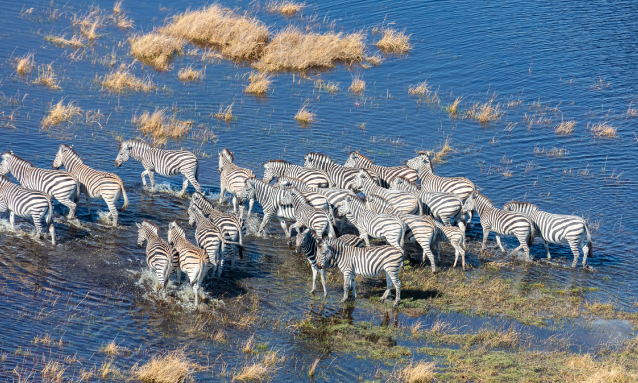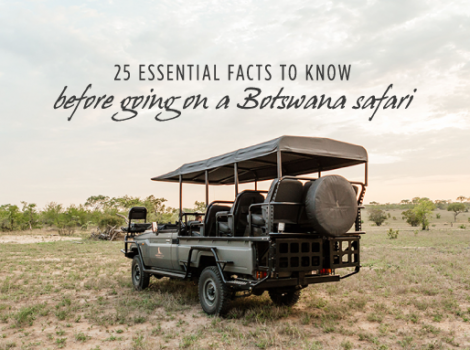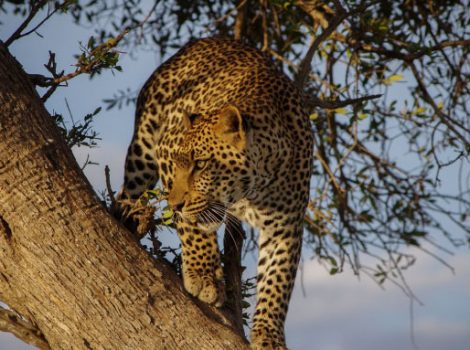
Botswana is generally a place of empty blue skies and boasts an enviable 300 days of dazzling sunshine a year. Thankfully around December, life-giving summer rains begin to fall, marking the start of safari’s low or Green Season. The bulk of the rain falls over January and February, and the landscape stays beautifully lush and green until about April.
Many safari-goers recommend visiting during the May to October dry winter season when game viewing is at its easiest. With only winter’s sparse vegetation to hide them, animals are more visible, especially when they congregate at shrinking waterholes and on riverbanks as the dry season grinds on.
The trouble is everyone else knows this, too. And coupled with the fact that Botswana’s dry season coincides with the northern hemisphere’s summer vacation period, Botswana’s major wildlife destinations get pretty crowded. So if you want all the drama of Botswana’s legendary game viewing without the crowds, consider a safari between December and March. It’s not only a case of fewer visitors: you will enjoy better rates and plenty of Green Season surprises.
The Best Colours and Light for Photography
Firstly, the rains transform the brown winter landscape into a startling green wonderland. Full-leafed acacia trees cast deep, cool shade over rolling green lawns; flowers leap up unannounced out of the sand, and crusty salt pans turn into shimmering wetlands full of honking waterbirds and colourful migratory species. The clean-washed air makes colours richer and deeper, the cloud-stacked sunsets are more intense – photographers will love the Green Season.
It’s Birthing Season – Predator Action!
As dramatic as the afternoon sky, so too is the reaction of Botswana’s wildlife to the rains. Antelope like impala and springbok take advantage of the new greenery to give birth – seemingly all at the same time! This is, of course, excellent news for Botswana’s long-toothed predators. If you want to see nature at its most ruthless and bittersweet, head for the nearest herd of ear-twitching herbivores with their lambs and wait for the circle of life to take its course.
Witness The Longest Land Migration on Earth
And not only do many animals drop their young in the Green Season, they also gather in great herds and go marching across the country. The Kalahari’s Nxai and Makgadikgadi Pans, as well as the Savuti area of Chobe National Park erupt into ‘lights-camera-action!’ drama as the annual zebra migration, eagerly followed by big cats and wild dogs, rolls into town for the fresh summer grazing.
Camps to consider: Nxai Pan, Savuti Camp, Meno a Kwena tented Camp
The Kalahari Comes Alive
Nowhere in Botswana sees a more striking transformation than the Kalahari. Indeed, it is during the Green Season that this usually inhospitable semi-desert comes alive. Lines of wildebeest and zebra wind their way onto the Makgadikgadi grasslands; buffalo and elephant – incongruous in this semi-desert setting – arrive at Nxai Pan National Park while the Central Kalahari Game Reserve, home to huge herds of springbok, echoes to the sounds of contented fat-bellied lions and ‘I-couldn’t-eat-another-bite’ cheetahs.
Camps to consider: Camp Kalahari, Jack’s Camp, Leroo la Tau
A Birdwatcher’s Paradise
And then there are the birds. Botswana has a wonderful range of resident species but as the rains arrive, so do migrant birds from Europe, Asia and other parts of Africa. Botswana’s bird watching goes from superb to sensational: kingfishers, kites, swallows, bee-eaters, rollers and cuckoos fill the air with extravagant song and colour. Everywhere is good for birding – the Kalahari, Savuti, the Okavango Delta, the Chobe River and Linyanti wetlands… even non-birders will get caught up in the excitement during a Botswana Green Season safari.
Source: go2africa.com



